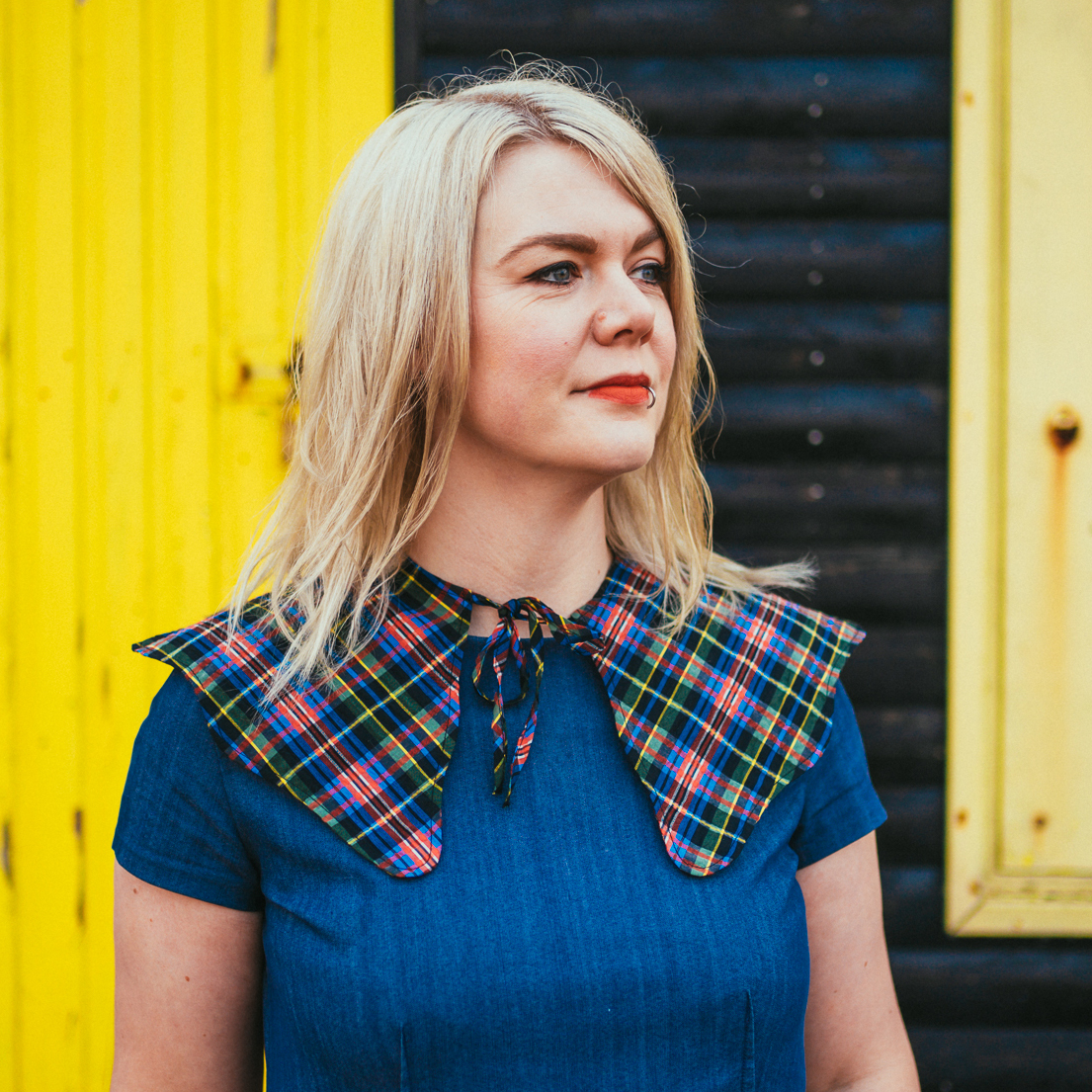“When I look back, The Strokes were like this tentpole. They led me to learn how to accompany myself and made me want to start my own band”: Waxahatchee’s Katie Crutchfield found her country voice via indie and riot grrrl
The Alabama-born songwriter recalls her formative punk years, graduating to a Thinline Tele, and embracing banjo and dobro on latest album Tigers Blood

All the latest guitar news, interviews, lessons, reviews, deals and more, direct to your inbox!
You are now subscribed
Your newsletter sign-up was successful
No-one could accuse Waxahatchee’s Katie Crutchfield of skipping the Southern States’ toilet circuit. At high school in Alabama, she formed her first musical group, teenage rock band The Ackleys, alongside twin sister Allison.
After three years, the duo launched feminist-fused PS Elliot, while also performing in pop-punk pairing Bad Banana. And that’s all before she stepped out solo in 2010, writing and recording under the moniker of Waxahatchee.
Over a decade on, the project has proved to be Crutchfield’s most unwavering constant – although she admits to holding up the sibling synchronicity and still sends Allison her latest riffs and ideas for feedback from on the road.
Today, she’s sat in what must feel like a familiar space given her prolific output to date. This East London studio, just off Commercial Street, has played host to iconic names from The Prodigy to Nick Cave.
But we’re both mostly excited about The Spice Girls’ blue plaque we passed on the way in. The sign tells us that Wannabe was recorded here in 1996. The quintet even practiced dance routines in the courtyard before they hit Number One across the globe. Crutchfield looks at ease: “When I walked in, I immediately felt at home,” she says. It’s certainly a different setting to her last press cycle.
Landing in early March 2020, just as the world went into lockdown, her breakthrough record Saint Cloud was heralded for its honest energy. Her sincere songwriting tracked a healing path as she ditched alcohol for good, tuning into herself and returning full circle like the moon’s cycle towards the country sounds of her youth.
With latest release Tigers Blood burning bright, we speak with the Alabama-born songwriter to hear about graduating to a Thinline Telecaster, returning to the sprawling Sonic Ranch studios in Texas, and her new hopeful era.
All the latest guitar news, interviews, lessons, reviews, deals and more, direct to your inbox!
You’ve said you’re a “project-driven person” and the “finished tangible thing at the end” is why you do it. How does it feel with the new record out in the world?
“It feels really good. The record’s been done now since the summer, so I’ve been basking in that doneness for a while. Once it’s out it belongs to everybody else and it’s a different thing. It’s like a baby bird that I’ve pushed out of the nest; and once it’s out of the nest it’s on its own.”
You were born in Alabama and grew up near your namesake Waxahatchee Creek, listening to your parents’ country records. How did that progress into picking up instruments?
“It’s hard to pinpoint when I got interested in discovering music that was mine. The Strokes hit when I was in middle school and that was like Backstreet Boys to me. I was like, 'Oh my God, I love this music and I love like how they dress. They’re so cool!’
“They were talking about the Velvet Underground and Guided by Voices and all these amazing reference points, that I would very feverishly go look up and discover. When I look back now at age 35, I think The Strokes were like this tentpole. They led me to learn how to accompany myself and made me want to start my own band.”
What was your first guitar?
“I was getting into rock music and I thought that was the instrument I had to play. I borrowed a classic black Fender Stratocaster from a family friend for my first year of learning. It was hard at first because I didn't have any examples – this was pre-YouTube.
“No-one in my family played the guitar so it took me a long time to even learn how to restring and tune it. But once I started to get the hang of it, I got the hang of it.
“The first proper guitar I bought myself was a Thinline semi-hollow Telecaster in Shell Pink. I remember learning to play Malibu by Hole. Those chords are simple. I loved Rilo Kiley so there were a couple of those songs that I was playing early on. But once I got the hang of chord progressions, I started to experiment with writing.”
You played in a few different guises with your sister Allison, including PS Eliot. What was the scene like in Birmingham, Alabama, at the time?
“When Allison and I discovered the riot grrrl thing, we related to and appreciated it. In hindsight, when I look back on that male-dominated hardcore scene, considering we were this poppy indie rock band, they were pretty accepting.
“We ruffled some feathers because there were a lot of traditional hardcore bands in Birmingham that wanted to play with Ceremony. But when the band came through they were like, ‘We want PS Elliot!’ even though we didn’t fit on the bill at all!”
Sometimes I get really in my head about chord progressions, but the truth is, who cares? If the vocal melody is different, go with what works
When you began writing and performing as Waxahatchee you shared that you were inspired by a lot of confessional songwriters who made you want to “try and make sadness well-articulated and profound.” How do you hit that brief?
“My guitar playing is about how I best support my voice; so moving the capo position is a great help. Sometimes I get really in my head about chord progressions, but the truth is, who cares? If the vocal melody is different, go with what works.
“A lot of the time, if I’m at the piano and I come up with a vocal melody, I’ll find it on my Gibson J-45, and I won’t be so hung up on that. My songwriting’s not as much about sadness anymore – I’m in a new hopeful era.”
Saint Cloud was heralded for its “hard-won sunlight and unexpected peace.” Why did it mean so much to you, and also to music fans?
“The reaction was unexpected, but it was very validating. I started leaning into the country thing. I never really saw myself that way until I went on tour with my partner Kevin in 2017. He said to me, ‘When I hear your voice and hear how you play, it’s country music to me.’ He saw something.
“I had been touring Out in the Storm, getting ready to do this rock thing but I felt drained by that. When we made Saint Cloud, I found my way to exactly where I wanted to be. It felt so much more correct than anything I’d ever done.”
Tigers Blood found you back working with Saint Cloud collaborator Brad Cook, hunkering down at Sonic Ranch in Tornillo, Texas. What lessons did you take from your last recording stint into the new album?
“The way we made Saint Cloud was so easy and organic. We didn’t feel that much pressure to get it right. Eventually, we landed on the fact that the confident choice is to do the same thing. Don’t overthink it – don’t feel like we have to reinvent the wheel.
I spend a lot of time scanning my records for mistakes. With Tigers Blood, I was able to set it aside – no notes
“We tried to make 365 into a poppier song, and we both had a complete meltdown. There’s magic that we can conjure together in the room and this was not it! All my heroes – Lucinda, Tom Petty, people whose entire catalog I admire – didn’t ever reinvent themselves. They do what they can to support the song; so that’s what we decided to do.”
The single Right Back To It is a nod to classic country duets, winding over a steadfast banjo from Phil Cook. Did you explore other interesting gear choices?
“Brad was back at Sonic Ranch working with Future Birds, and Cage the Elephant were in one of the other studios. Brad texted me, 'Hey, I think I hear pedal steel onboard; do you mind?’ We were also talking about how harmonica would be cool, and Phil said, ’It sounds cool when you take a mic, plug it into a little amp and then blow into it.’
“When you have someone like Phil, who can play dobro and banjo, it makes you want to try it at least. Brad is a real process-of-elimination type of producer: ‘Let’s put it all up there, and then the actual work is figuring out what needs to be there.’”
It’s over a decade since you started performing as Waxahatchee. What are you most proud of so far?
“I’m so proud of the last few records. A lot of times when I’ve made a record, I spend a lot of time scanning it for mistakes. With Tigers Blood especially, I was able to set it aside. No notes.
“People are gonna like it, and I know I love it. These last two records have helped prove that I’m doing what I always wanted to do. Now I can just trust myself and try and tune into that.”
- Tigers Blood is out now via ANTI- Records. Waxahatchee tours the US and UK April through September – see Waxahatchee.com for more info.
Cheri Amour is a writer, editor and broadcaster intent on amplifying the voices of women and non-binary artists in print, online and on air. During her twenties, she played lead guitar in a touring two-piece, sharing the stage with The Slits and John Peel-approved punks The Nightingales. Formerly Deputy Editor at TGA Magazine, Cheri headed up its Tech section pouring over pedals with everyone to indie icon Debbie Smith (Echobelly/Curve) to multi-instrumentalist Katie Harkin (Sleater Kinney/Waxahatchee/Wye Oak). She's currently working on an upcoming 33 1/3 book on the unassuming influence of South Bronx sister troupe ESG, out in Spring 2023.





